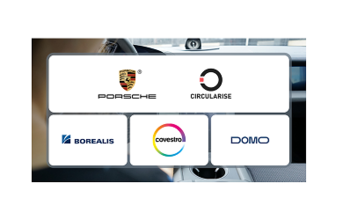
Circularise, the blockchain supply chain transparency provider, as part of the Startup Autobahn innovation program, recently launched a project with Porsche and its pioneering material suppliers -Borealis, Covestro and Domo Chemicals - to enable the traceability of plastics on blockchain and to ensure that the use of sustainable materials in Porsche cars can be proven. By digitizing materials Circularise was able to create a digital thread through the whole supply chain, enabling material traceability, tracking the CO2 footprint and other sustainability metrics like water savings.
Getting information from supply chains has always been a challenge. Not only because of the inherent complexity of the supply have chains and the multitude of suppliers, but also due to concerns around trusted, privacy and confidentiality. That is why blockchain is offering such a fitting solution to transparency challenges in supply chains. "We believe transparency should not come at the cost of reduced privacy and confidentiality. That is why we developed our patent pending technology for creating verified statements on public blockchains without revealing any underlying sensitive data. While this raw data is very valuable in a B2B setting, consumers demand a more distilled and interactive version. We are proud to present exactly that in collaboration with Porsche and some of their pioneering suppliers," says Mesbah Sabur.
Porsche has a large number of suppliers providing parts to its cars but it doesn't stop the company looking for more information about the materials that go into its cars. According to Antoon Versteeg, Project Lead Innovation Research at Porsche,"We need to know more details on the parts and materials being used in our products, that means information on production processes deep down the supply chain, statements of recycled content and more. With the help of Circularise, as well as with the help of their partners we were able to trace for a number of specific cases plastics from raw material production to the final car."
A number of suppliers who can deliver sustainably produced materials for the automotive industry were involved in this project to realise the final outcome. Each batch of material was digitized on the blockchain receiving a digital copy called digital twin. The digital twin carries all relevant information regarding the batch, such as its environmental footprint and origin. This digital thread created transparency between project partners leading to an improved supply chain collaboration.
This also offers great advantages to the material manufacturers. According to Thomas Nuyts, Director of Global Product Management at Domo Chemicals, "as leader in the production of sustainable polyamides, we at Domo can only gain by making the supply chain more transparent. By tracking our materials, we will make a huge step ahead in supporting the automotive industry in its sustainability challenges. Besides providing recycled solutions from current sources we also aim to enlarge this loop and find new raw materials for our products to meet the mobility needs of today and tomorrow."
However, the companies cannot simply create a digital twin. First, the batch of materials needs to be audited by an independent third party to verify that the material and related claims are true. "Verification is essential. Even with a supply chain involving blockchains we want independent auditors for our system. And this is how we gain the trust and confidence of all our value chain members. Several years from now, after these systems are in place on a wider scale, things will have been standardized. For now, it's still early days. Auditors and certifications are essential to ensure that no one can engage in greenwashing. But we really need to pick up the pace as we keep moving towards more circularity,"says Christopher McArdle, Borealis Vice President Polyolefin Strategy and New Business Development.
Once the materials are digitized, the parties along the supply chain can now update the digital twin mimicking the physical supply chain and reflecting the manufacturing processes along the lifecycle of the product. Due to Circularise's "Smart Questioning" technology this process can happen while preserving everyone's privacy regarding their identity and business relations and protecting confidential information.
Burkhard Zimmermann, Head of Resin, Digital Transformation & Sustainability at Covestro's Polycarbonates segment: "For us, it is really important to share information and be more transparent while maintaining confidentiality. For instance, the material composition is of competitive advantage so we would never share that openly. Here, Circularise helps us to maintain this confidentiality and only disclose the information needed from raw material producer to recycler. And with that, we can close the loop."
END



























